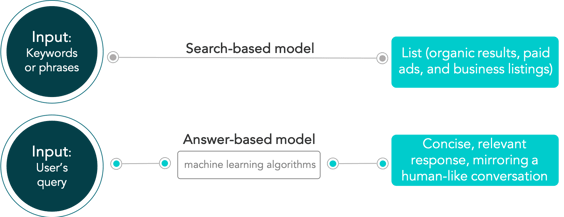AI is already emerging as a game changer in the hospitality industry, reshaping guest experiences and revenue strategies for hoteliers. Shifting to AI-driven platforms like chatbots, visitors expect immediate, relevant information, transforming online interactions.
NB: This is an article from The Hotels Network, one of our Expert Partners
Subscribe to our weekly newsletter and stay up to date
This article explores the impact of these technologies on the booking journey and 2024’s hospitality landscape, based on THN’s Chief Experience Officer Michael J. Goldrich’s latest eBook on hotel marketing trends.
The transition from a search-based to an answer-based approach
Traditionally, platforms like Google require users to scroll through links for information. In the Answer-based model, seen in technology like ChatGPT, AI directly responds to user queries, providing concise information within the same interface.

New ways to access information
The emergence of chatbots and voice assistants signals a fresh era in how information is accessed and interacting with hospitality services. These AI-driven technologies offer users immediate, personalized assistance, streamlining the process of finding relevant information and making bookings. While they present opportunities for hotels to enhance the guest experience and drive direct bookings, they also require careful adaptation of marketing strategies and customer service protocols to ensure seamless integration and maintain brand integrity amidst evolving consumer expectations.
A shift in user’s expectations when it comes to answers
The evolving demands of social media habits and short-form videos have shifted the user’s need for swift, precise, and personalized responses when searching for information on your property’s website. Those potential guests now expect immediate, accurate answers that align precisely with their queries.
To adapt to these evolving expectations, hotels can integrate AI tools like chatbots on their direct channel, focusing on hyper-personalization, optimizing content strategy, and leveraging data.
Content strategy: SGE is the new SEO
While traditional SEO focuses on enhancing website visibility and emphasizes keyword frequency, Search-Generative Experience (SGE) leverages advanced AI and highlights contextual relevance to deliver direct responses to user inquiries.
As discussed above, AI-driven technologies will likely lead to reduced organic website traffic for hotels, prompting the need for a strategic approach to engage and convert visitors effectively. While adopting AI for guest interaction is crucial, your property should also focus on adjusting its website’s content to adapt to SGE. This involves anticipating certain questions your potential guests might have (about amenities, policies, local attractions…) while ensuring accuracy and brand consistency.





